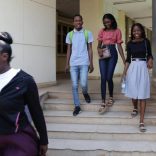Groups call for zero tolerance on sexual harassment of students in Mozambique
Gorongosa Park and University of Oxford seek mankind’s ancestors in Mozambique

Photo:Euronews
Gorongosa National Park has announced the signing of a collaboration agreement with the University of Oxford, England, for a research project that seeks to uncover details about human ancestry.
Called the Paleo-Primate Project, the initiative is led by Portuguese paleoanthropologist and primatologist Susana Carvalho.
“Several promising fossil sites have been identified in Gorongosa Park,” Xarvalho says, and what may be “an exploration and research effort lasting several decades” has just started.
In the end, it may produce “new ideas about when and how the first human ancestors evolved in Africa”, a statement released today reads.
Another branch of the multidisciplinary project “is the focus on the study of modern primates and their behavioural adaptations to Gorongosa ecology, to model how human ancestors in the past may have managed to live in similar habitats,” the statement adds.
In 2017, Carvalho told Lusa that Gorongosa “represents the last unstudied link in the great African Rift that runs across eastern Africa, wherein lie the ‘cradles of mankind’. Preliminary research conducted in 2016 confirms that the Gorongosa Rift Valley bears new fossil sites, and provides astounding ecological diversity as a setting within which to investigate primate evolution, both past and present”.
Initial geological surveys point to chronologies that cover the period of seven million years when the first hominids appeared.
The park claims the Oxford-Gorongosa Paleo-Primate Field School is “the only field school in the African continent that offers interdisciplinary training in paleoanthropology, primatology and ecology”. Half of its students are from Mozambican universities.












Leave a Reply
Be the First to Comment!
You must be logged in to post a comment.
You must be logged in to post a comment.